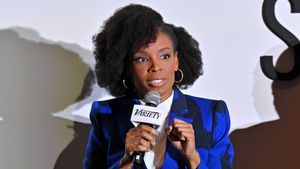GLAAD released its second annual Studio Responsibility Index today, grading the seven largest motion picture studios on the quantity, quality and diversity of images of LGBT people in their films released during 2013.
GLAAD’s research revealed that only 17 of the studios’ 102 releases in 2013 included LGBT characters, a slight improvement from the 14 LGBT inclusive films from 2012. However, while there was a minor increase in number of films including LGBT characters, a majority of them were minor roles or cameos, many of which were defamatory representations of LGBT people. Not a single mainstream film from the seven studios included an LGBT lead character.
“The lack of substantial LGBT characters in mainstream film, in addition to the outdated humor and stereotypes, suggests large Hollywood studios may be doing more harm than good when it comes to worldwide understanding of the LGBT community,” said GLAAD CEO and president Sarah Kate Ellis in a statement. “These studios have the eyes and ears of millions of audience members and should reflect the true fabric of our society rather than feed into the hatred and prejudice against LGBT people too often seen around the globe.”
Using the Vito Russo Test — a set of criteria named after GLAAD cofounder and celebrated film historian Vito Russo, which was developed last year to analyze how LGBT characters are represented in fictional works — GLAAD examined the 17 films.
The Vito Russo Test requires films fulfill each of the following to receive a passing grade:
- The film contains a character that is identifiably lesbian, gay, bisexual, and/or transgender (LGBT).
- That character must not be solely or predominantly defined by their sexual orientation or gender identity (i.e. the character is made up of the same sort of unique character traits commonly used to differentiate straight characters from one another).
- The LGBT character must be tied into the plot in such a way that their removal would have a significant effect. Meaning they are not there to simply provide colorful commentary, paint urban authenticity, or (perhaps most commonly) set up a punchline; the character should matter.
Only seven of the 17 films that featured an LGBT character managed to pass the Vito Russo Test.
On the following pages, see how each studio was ranked and rated in GLAAD’s 2013 Studio Responsibility Index.

Above: Kyle Chandler in Broken City
20th Century Fox
2013 Rating: Adequate
GLAAD gave Fox, which in the past has produced groundbreaking films like Myra Breckinridge (1970), The Rocky Horror Picture Show (1975), and Making Love (1982), the rating of “adequate” for its 2013 lineup. Out of the 14 films released last year, only one, Broken City, included LGBT characters and passed the Vito Russo Test, though the sexuality of Cameron Diaz’s character in another feature, The Counselor, has been the subject of debate.
Although some of its language and language usage in Broken City is problematic (“fag” is volleyed during a sporting match), the political drama, which stars Russell Crowe as the mayor of New York and Mark Wahlberg as a private eye he hires to investigate his wife for infidelity, eventually finds its footing. A minor but essential character, Paul, who the mayor suspects of being the other participant is his wife’s affair, is eventually revealed to be the gay lover of the rival mayoral candidate. Although Paul is murdered and martyred, GLAAD notes that he is “the closest thing the film has to a moral center.” One of the scenes also features a Human Rights Campaign event celebrating the passage of marriage equality.
For the inclusion of these two gay characters in Broken City, while giving Fox the “adequate” rating, GLAAD noted that “this definitely counts as progress, and we hope Fox keeps moving in the right direction.” However, the organization hopes that in the future, such characters won’t be featured with “‘blink and you’ll miss it’ subtlety.”

Above: Kali Hawk and Kimrie Lewis-Davis in Peeples
Lionsgate
2013 Rating: Adequate
Lionsgate, making its first appearance in the GLAAD report, is the youngest of the studios tracked, having released its first film in 1997. Since then it has become a major player, growing through acquisition of other studios, and has produced some big-budget, mainstream films in addition to art-house fare.
The studio received an overall rating of “adequate” for 2013. Three of Lionsgate’s 21 releases for the year were LGBT-inclusive, and two of them passed the Vito Russo Test. The one most praised by GLAAD is Peeples, which centers on an affluent African-American family having a reunion in the Hamptons. One of the daughters, Gloria (Kali Hawk), is attending with her secret girlfriend, Meg (Kimrie Lewis-Davis), and struggling with the decision to come out to her family. “Though Meg and Gloria’s storyline briefly plays into straight-male fantasies about three-ways with lesbian couples, they have a significant presence throughout the film and are accepted without question by the other characters,” GLAAD’s report notes. “This film signifies positive progress, especially for films heavily marketed to African American audiences.” What’s more, GLAAD points out, one of the producers is Tyler Perry, whose work as a director has included some problematic LGBT content.
Instructions Not Included has a humane portrayal of a lesbian couple involved in a custody battle with the film’s protagonist, but it also has a transgender character whose only purpose is to be laughed at. The Big Wedding features a bisexual character, the mother of the bride, played by Christine Ebersole. GLAAD reports that the character “could have been better handled,” as her attraction to women is referred to as a “fetish.”
Lionsgate’s 2013 releases also included the science fiction saga Ender’s Game, which had no LGBT content, objectionable or otherwise, but was based on a novel by Orson Scott Card, who is well known for his antigay activism. Lionsgate received criticism for its association with Card and responded by releasing a statement asserting its support for LGBT people. The film ended up flopping at the box office.

Above: Jon Spinogatti (on sofa) in The Wolf of Wall Street
Paramount Pictures
2013 Rating: Failing
Out of the nine films released by Paramount Pictures in 2013, only two included LGBT characters. However, both of these films, Pain & Gain and The Wolf of Wall Street, failed the Vito Russo Test. The characters were not significant to the stories, both were evocative of harmful stereotypes and were punished with violence for their behavior.
Directed by Martin Scorsese, whose oeurvre often focuses on masculinity and modern crime, The Wolf of Wall Street is a blockbuster adaptation of the memoir of Jordan Belfort, a former stockbroker who was convicted of fraud for his shady Wall Street wheelings and dealings. Garnering four Oscar nominations, the film, which stars Leonardo DiCaprio as Belfort and Jonah Hill as his friend and business associate Donnie Azoff, paints a glamorized portrait of Belfort’s rise to success through the founding of his brokerage firm Stratton Oakmont. Along the way, he and his predominantly heterosexual male cohorts throw excessive parties that include drug and alcohol use, prostitution, and at least one instance of “dwarf-tossing,” where little people wearing Velcro padding are hurtled against the wall for sport. The tables turn on Belfort in one particularly problematic scene, in which his fiancée returns to his apartment to discover that their butler has thrown an orgy with other men. Subsequently, the man is beaten by Belfort’s cronies and then arrested on a trumped-up charge of theft. The scene involving this gay character is less than three minutes long and is not essential to the narrative. As GLAAD notes, the unneeded violence in a film that already runs at a bloated three hours is just “one more example of the main characters’ outrageous behavior the audience is invited to take delight in watching.”
Pain & Gain, another testosterone-drenched feature, is directed by Michael Bay and suffers from the same problem as The Wolf of Wall Street in its inclusion of a nonessential gay character whose behavior is punished with violence. Based on a book by reporter Pete Collins, who covered crimes committed by a gang of bodybuilders for the Miami New Times, the film includes a minor scene that is not based on real-life events: the beating of an elderly priest after he makes advances to one of the leads, Paul, who is played by Dwayne Johnson. Much as in Wall Street, the scene holds no purpose for the plot other than to evoke a harmful stereotype, which is used to justify the use of violence as “gay panic defense.”
In light of these portrayals, GLAAD has given Paramount Pictures a failing rating and advised the company to live up to the standards of the LGBT-themed and -inclusive films that it has produced in the past, including Clueless,The Talented Mister Ripley,Election, and The Hours. The guidelines it offers are as follows: “Don’t simply include LGBT characters in films aimed at an adults-only audience. Don’t exclusively define these characters by inappropriate or aggressive sexual behavior within moments of their appearing onscreen. And don’t follow up that behavior with depictions of them being violently attacked before inviting the audience to forget they ever existed. Paramount can and must do better.”

Above: Battle of the Year
Sony Columbia Pictures
2013 Rating: Good
Three of the 15 films released by Sony Columbia Pictures in 2013 included appearances by LGBT people. Two of those films, The Mortal Instruments: City of Bones and Battle of the Year, passed the Vito Russo Test, while Grown Ups 2 did not.
GLAAD applauded the portrayal of gay and bisexual characters in The Mortal Instruments: City of Bones. The first film in a proposed franchise based on the series of young adult novels by Cassandra Clare, the film tells the story of demon-hunters who reveal to a young girl she’s one of their kind. Among the group of hunters is a young man named Alec, who is hiding the fact that he’s gay from the group. Alec later catches the eye of Magnus, a bisexual warlock who assists the hunters. If a sequel is produced, fans can expect to see this relationship develop further.
GLAAD praised the dance film Battle of the Year for its inclusion of Lil’ Adonis, a gay juvenile delinquent turned b-boy dance crew member who clashes with Sniper, a homophobic member of his crew. The two eventually come to respect each other, and though Adonis has few lines, his character is essential to the plot, helping Battle of the Year narrowly pass the Vito Russo Test.
Grown Ups 2 was criticized by GLAAD for its use of “needlessly offensive” jokes, which include a group of women booing their gay yoga instructor after he comes out to them and yelling “What a waste” as well as repeated jokes about a female bodybuilder secretly being a man and having a penis because of her perceived masculinity.

Above: Kick Ass 2
Universal Pictures
2013 Rating: Adequate
Last year Universal released 15 movies, and only three of them were LGBT-inclusive; GLAAD gave the studio an "adequate" rating.
In the first Kick-Ass movie, the protagonist was spurred to become a "real world" superhero because he was being bullied and mistaken for gay. While the first film contained no LGBT characters, Kick-Ass 2 included Insect Man, who introduces himself by saying he wanted to stand up for the defenseless after a lifetime of bullying,and that he didn't wear a mask because it felt like being back in the closet. In the Rachel McAdams and Domhnall Gleeson film About Time, Tim (Gleeson) approaches his ex-girlfriend, who is accompanied by another woman. According to GLAAD, the reveal that the ex-girlfriend's companion is a lesbian is not necessarily problematic, but the character exists only to "provide a humorous miscommunication for the protagonist."
Riddick featured the most significant LGBT character in Universal's releases in the last two years. But even Dahl, a gruff lesbian sniper played by Katee Sackhoff, is still objectified as the only one shown nude in a shower scene, and is the subject of an attempted rape.
Meanwhile, the company's subsidiary Focus Features has a track record of producing or releasing some of the most pivotal LGBT movies of the last decade, including The Kids Are All Right (2010), Pariah (2011), Milk (2008), and Brokeback Mountain (2006). Last year Focus released Dallas Buyers Club as well as the documentary We Steal Secrets: The Story of Wikileaks, which included footage of transgender soldier Chelsea Manning.
"Riddick is a film that is transparently designed to appeal to a straight male audience, but Universal (and frankly all the studios) must recognize that going after one audience doesn’t have to mean denigrating and alienating others," the organization said in the study. "As we’ve said before, we must see more LGBT characters in genre films, and there’s no reason those depictions should be compromised to make them 'fit.' Kick-Ass 2 is actually a good example of that, despite that character’s very minor role."

Above: Delivery Man
Walt Disney Studios
2013 Rating: Adequate
Walt Disney Studios earned an “adequate” rating from GLAAD for 2013, an improvement over “failing” in 2012, but still, of its 10 releases, only two had LGBT characters, and neither film passed the Vito Russo Test.
Delivery Man stars Vince Vaughn as a sperm donor anonymously observing some of the hundreds of offspring he’s fathered. One of them, a son, is gay, and Vaughn’s character watches him encounter several men who seem to be his boyfriends. This inspires “good-natured parental concern” rather than homophobia, according to GLAAD. The gay son is not significant enough for the film to pass the Vito Russo Test, but he is well-handled and even gets to kiss a few of the men in his life. The film provides “a nice change of pace from most Hollywood comedies,” GLAAD reports.
The superhero entry Iron Man 3 features gay TV journalist Thomas Roberts as himself, delivering a bit of news, but his appearance amounts to just two seconds, compared with the eight seconds he got in 2012’s The Avengers, based, like Iron Man 3, on Marvel heroes. Disney recently acquired Marvel Studios, and “we continually hope that Marvel films will include more substantial characters,” notes GLAAD.

Above: We're the Millers
Warner Bros.
2013 Rating: Failing
Out of the 18 movies Warner Bros. released, three contained characters that could be deemed LGBT, but none of them, GLAAD says, were positive or pivotal characters.
In the Robert De Niro and Sylvester Stallone flick Grudge Match, there's a scene in a jail cell in which a transgender woman dressed as a sex worker cracks jokes to seemingly provide "urban color," as the report puts it. In the summer comedy We're the Millers, a Mexican police officer pulls over a group of people masquerading as an American family as they smuggle drugs across the border. He says he'll let them go if one of the men performs a sex act on him. And the sadistic Leslie Chow, who was a mainstay in the Hangover movies, is portrayed as having a sexual interest in men. GLAAD says that while the third film has improved over the first two, as far as LGBT portrayals go, Chow does say to one of the protagonists, “Want Chow to blow your dick? ... I could be a good wife to you!”
"These characters are disappointing throwbacks to a time when members of our community only appeared in Hollywood films to make an audience uncomfortable or set up a joke," the organization said in the report. "Particularly in their comedies aimed at young male audiences, Warner Brothers has a lot of growing up to do."
For more information, read GLAAD's full Studio Responsibility Index report here.




































































































































